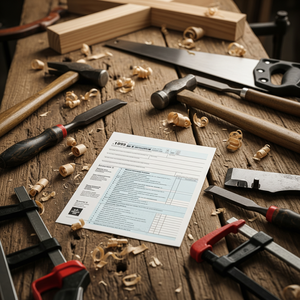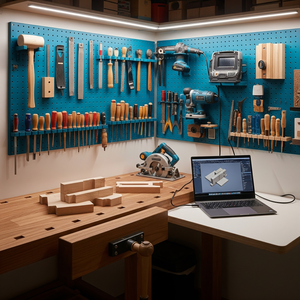Bookkeeping for Carpenters: Top 5 Overlooked Tax Deductions for Carpenters
Building a Better Bottom Line
For small business owners, understanding the essentials of bookkeeping for carpenters and knowing how to handle tax deductions is crucial, and while many use software, a deep dive into QuickBooks for carpenters reveals how to properly track QuickBooks Online tax deductions to save thousands.
You’re a master with a miter saw and can frame a wall that’s perfectly plumb and square. But when it comes to the financial side of your business, are you as precise? Every year, thousands of self-employed carpenters overpay the IRS simply because they miss out on deductions they are fully entitled to claim. It's not about finding loopholes; it's about understanding the rules of the game. The truth is, nearly every aspect of your work—from the truck you drive to the workshop you rent—comes with a potential tax benefit. Leaving that money on the table is like throwing away your most expensive hardwood.
At Sync-Up Bookkeeping, our mission is to promote financial literacy for business owners just like you. In this guide, we will break down the top 5 most overlooked tax deductions for carpenters. Our goal isn't just to give you a list but to empower you with the knowledge to work confidently with your bookkeeper and tax professional, ensuring you keep more of your hard-earned money. Let's get started.
Deduction #1: Your Work Truck & Vehicle Expenses
Your truck is more than just a way to get to the job site; it's a mobile toolkit and a major source of tax deductions. Yet, many self-employed carpenters don't maximize this write-off because they don't know the rules. The IRS gives you two ways to deduct your vehicle expenses: the Standard Mileage Rate and the Actual Expense Method.
The Standard Mileage Rate: This is the simpler method. The IRS sets a specific rate per mile (it changes almost every year). You simply track all the miles you drive for business—to job sites, to the lumber yard, to meet clients—and multiply that total by the standard rate. This one number is meant to cover all the costs of operating your vehicle, including gas, oil changes, insurance, and wear and tear. While simpler, it still requires diligent tracking of your business miles.
The Actual Expense Method: This method involves tracking every single dollar you spend on your truck for business purposes. This includes gas, oil changes, insurance, registration fees, repairs, new tires, and even the interest on your vehicle loan and depreciation. It's more work, but for a heavy-duty work truck that requires a lot of maintenance, it can often lead to a much larger deduction.
Understanding the difference is a key part of bookkeeping for carpenters. The best method depends on your vehicle's cost and how you use it. This is a perfect example of the importance of good Expense Tracking. When all your costs are clearly organized, you and your tax professional can easily choose the method that saves you the most money.
Deduction #2: The Tools of Your Trade (Large and Small)
Your tools are the extension of your hands and your skill—they are also a goldmine of tax deductions. From a simple hammer to a high-end table saw, nearly every tool you buy for your business is deductible. However, how you deduct them depends on the cost and lifespan of the tool.
This is a key area of bookkeeping for carpenters that many people find confusing. The IRS generally sees tools in two ways:
Supplies/Expenses: Smaller, less expensive tools or items that get used up within a year are considered simple business expenses. Think of things like saw blades, drill bits, sandpaper, tape measures, and safety glasses. You can typically deduct the full cost of these items in the year you buy them.
Assets (Depreciation): Larger, more expensive tools that last for more than a year—like your miter saw, table saw, compressor, or planer—are considered assets. Instead of deducting the full cost upfront, you deduct a portion of their cost each year over their "useful life." This process is called depreciation. Think of it this way: a box of screws is used up on one job (an immediate expense), but your new table saw will help you build projects for years to come. The IRS wants you to spread the cost of that saw over the years it helps you earn income.
The key is diligent record-keeping. A service like our Expense Tracking helps you categorize every purchase correctly. This allows your tax professional to determine the best way to handle each one, whether as an immediate write-off or through depreciation, ensuring you get the maximum benefit from your investment in high-quality tools.
Deduction #3: Home Office & Workshop Space
Whether it's a spare room where you draw up bids and manage invoices or a corner of your garage dedicated to project prep, the space you use for your business at home is a significant source of tax deductions. Many carpenters miss this entirely because they don't realize their workspace qualifies. This deduction is a prime example of what the IRS calls the Business Use of Personal Property.
To qualify, the space must be used exclusively and regularly for your carpentry business. If it meets that test, you can deduct a percentage of your home's costs. This includes a portion of your rent or mortgage interest, property taxes, utilities, and homeowner's insurance. Think about it: the electricity used to power your saws in the workshop or the internet service you use to email clients are legitimate business expenses.
The key to claiming this powerful deduction is tracking all of these seemingly personal costs. Proper bookkeeping for carpenters involves categorizing these shared costs throughout the year. At tax time, your CPA can use these organized records to calculate the precise percentage of your home expenses that can be written off, ensuring you get the full deduction you're entitled to without raising red flags.
Deduction #4: Insurance & Professional Fees
Running a professional carpentry business means protecting yourself, your clients, and your reputation. The costs associated with this protection—from insurance premiums to professional dues—are essential business expenses and are fully tax-deductible. These are often paid only once or twice a year, making them easy to forget when tax time rolls around.
Common deductible professional expenses for a carpenter include:
Liability Insurance: The premium for your general liability insurance is a critical and deductible cost of doing business.
Workers' Compensation: If you have a crew, you know that workers' comp is a major expense. The premiums you pay are fully deductible.
Professional Dues & Licenses: The fees you pay to maintain your contractor's license or memberships in professional organizations (like a local builder's association) are deductible.
Continuing Education: The cost of classes or workshops to maintain your license or learn a new skill (like advanced joinery or estimating software) is also a deduction that invests back into your business's success.
These are not minor expenses; they add up to a significant amount over the year. A key part of our bookkeeping service is ensuring these infrequent but important payments are meticulously tracked and categorized. This guarantees that when you work with your CPA, you have a complete record of every professional fee, leading to full tax compliance and a lower tax bill.
Deduction #5: Communication & Software Subscriptions
In today's world, your phone and computer are just as important as your hammer and saw. The costs associated with staying connected and organized are legitimate business expenses, yet they are among the most commonly missed deductions, especially if you use personal devices for work.
This is another key area of Business Use of Personal Property. You can't deduct your entire cell phone or home internet bill, but you can deduct the percentage you use for your business. If you spend 60% of your time on your phone talking to clients, coordinating with suppliers, and managing projects, then 60% of your monthly bill is a deductible business expense. The same principle applies to your home internet if you have a qualifying home office.
Furthermore, any software you use to run your business is deductible. This includes:
Estimating or bidding software.
Project management tools.
Design or CAD software.
Your subscription to QuickBooks for carpenters itself!
These are often small, recurring charges that are easy to overlook. A proper bookkeeping system ensures every one of these subscription fees is captured, adding up to a significant deduction over the course of the year.
Conclusion: Building Your Most Profitable Business
As we've seen, your vehicle, tools, workspace, insurance, and even your phone bill are all powerful tools for lowering your tax burden. By understanding and diligently tracking these top five deductions, you can ensure you're not leaving your hard-earned money on the table.
Ultimately, maximizing your tax deductions isn't about finding secret loopholes; it's about having a clear and accurate picture of your business finances. This is the core of financial literacy. When you have a solid bookkeeping system in place, you move from guessing to knowing. You can price your jobs more profitably, make smarter decisions about purchasing equipment, and face tax season with confidence instead of anxiety.
If you're tired of the stress and uncertainty that comes with DIY bookkeeping, it might be time to bring in a professional partner. At Sync-Up Bookkeeping, our comprehensive bookkeeping services for carpenters are designed to take these complex financial tasks off your plate. We help you track every detail, so you can focus on what you do best: your craft.
Ready to build a stronger financial foundation for your carpentry business? Schedule a free consultation today.
Share on Social
Bookkeeping in Action:
The Adventures of Coco and Cami
Follow the entrepreneurial journeys of Coco, who's opening a sandwich shop, and Cami, starting a coffee shop, as they find themselves faced with the new challenges of bookkeeping to track their businesses.
Watch as Professor A breaks down the fundamental concepts of bookkeeping for Coco and Cami, explaining why it's the essential foundation for understanding a business's financial health.









